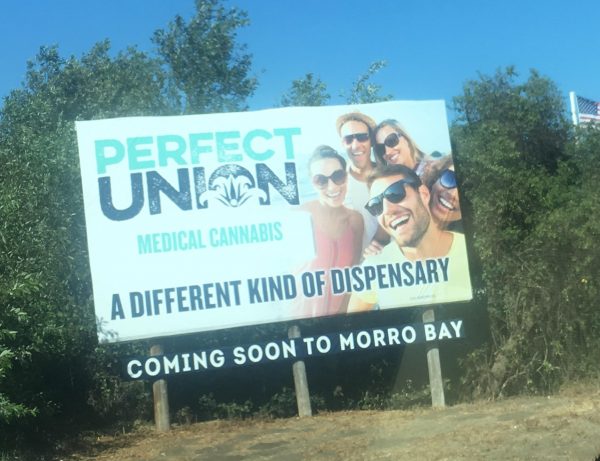Is Morro Bay marijuana shop violating state law?
September 26, 2019

Clarification: Representatives of Perfect Union said they were relying on the California Bureau of Cannabis Control’s determination that advertising marijuana on billboards located on interstate highways at least 15 miles from state borders is permitted.
California Business and Professions Code (state law) 26152, states licensed marijuana businesses shall not “advertise or market on a billboard or similar advertising device located on an Interstate Highway or on a State Highway which crosses the California border.”
While not a legislative body, “the bureau determined that a 15-mile radius was a necessary and appropriate distance from the California border because it satisfies the intent of section 26152(d) of the Business and Professions Code, while assuring that Bureau licensees have an opportunity to advertise and market along Interstate and State Highways if they satisfy the identified radius limitations,” an interpretation of the law that is likely to face legal challenges.
By KAREN VELIE
As the owners of retail marijuana businesses battle for their piece of the San Luis Obispo County market, at least one seller appears to have violated California’s cannabis advertising rules by placing a billboard on Highway 101.
In Jan. 2018, laws banning marijuana advertising on billboards located on California interstate highways or state highways that cross the border of any other state went into effect. In late 2017, a Nipomo based marijuana delivery service, Diamond Cannabis, removed several billboards from Highway 101. [Cal Coast Times]
Recently, Perfect Union, the winner of one of two coveted permits for retail cannabis shops in Morro Bay, began advertising on Highway 101 in San Luis Obispo. City officials said they chose to work with Perfect Union because of its history of legally operating marijuana shops in California.
“We look forward to working closely with them to ensure their businesses integrate successfully with the Morro Bay community and are operating in a manner with state and local regulations,” the city said in an announcement.
Representatives of Perfect Union did not respond to questions about the billboard.
In 2016, California voters decriminalized cannabis use, a move that turned hundreds of criminals into legitimate business owners. And while some abide by state laws, which are similar to tobacco legislation, others continue to operate under their own rules.
Navigating marijuana advertising laws can be tricky. While voters elected to decriminalize pot, they did not vote for unregulated commercialization.
Social platforms like Twitter, Google and Facebook have banned all cannabis advertising. In California, cannabis ads can only be shown where at least 71.6 percent of the audience is expected to be over the age of 21.






The comments below represent the opinion of the writer and do not represent the views or policies of CalCoastNews.com. Please address the Policies, events and arguments, not the person. Constructive debate is good; mockery, taunting, and name calling is not. Comment Guidelines